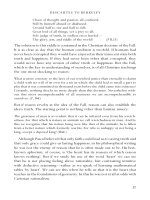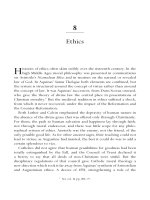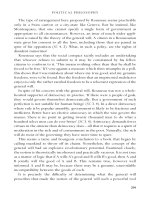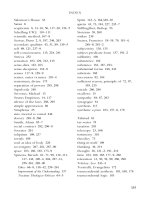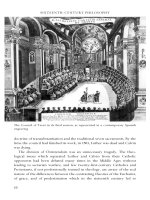The rise of modern philosophy a new history of western philosophy volume 3 (new history of western philosophy) ( PDFDrive ) (1) 72
Bạn đang xem bản rút gọn của tài liệu. Xem và tải ngay bản đầy đủ của tài liệu tại đây (17.72 KB, 1 trang )
DESCARTES TO BERKELEY
Chaos of thought and passion, all confused;
Still by himself abused or disabused;
Created half to rise and half to fall;
Great lord of all things, yet a prey to all;
Sole judge of truth, in endless error hurled—
The glory, jest, and riddle of the world!
(P II,13)
The solution to this riddle is contained in the Christian doctrine of the Fall.
It is as clear as day that the human condition is twofold. If humans had
never been corrupted they would have enjoyed in their innocent state both
truth and happiness. If they had never been other than corrupted, they
would never have any notion of either truth or happiness. But the Fall,
which is the key to understanding of ourselves, is of all Christian teachings
the one most shocking to reason:
What is more contrary to the laws of our wretched justice than eternally to damn
a child with no will of its own for a sin in which the child had so small a part to
play that it was committed six thousand years before the child came into existence?
Certainly, nothing shocks us more deeply than this doctrine. Nevertheless without this most incomprehensible of all mysteries we are incomprehensible to
ourselves. (P, 164)
But if reason revolts at the idea of the Fall, reason can also establish the
idea’s truth. The starting point is nothing other than human misery:
The greatness of man is so evident that it can be inferred even from his wretchedness. For that which is nature in animals we call wretchedness in man. And by
this we recognize that his nature being now like that of the animals, he is fallen
from a better nature which formerly was his. For who is unhappy at not being a
king, except a deposed king? (Ibid.)
Although Pascal believed that only faith could lead us to saving truth and
that only grace could give us lasting happiness, in his philosophical writing
he was not the enemy of reason that he is often made out to be. His bestknown aphorism, of course, is ‘the heart has its reasons of which reason
knows nothing’. But if we study his use of the word ‘heart’ we can see
that he is not placing feeling above rationality, but contrasting intuitive
with deductive reasoning—rather as we speak of learning mathematical
tables ‘by heart’. We can see this when he tells us that it is the heart that
teaches us the foundations of geometry. In this he was not at all at odds with
Cartesian rationalism.
57

